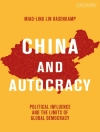Neoliberalism and deregulation have come to dominate national and international political economy. This major book addresses this convergence and analyzes the implications for the future of capitalist diversity. It considers important questions such as: Is the preference for free markets a well-founded response to intensified global competition? Does this mean that all advanced societies must all converge on an imitation of the United States? What are the implications for the institutional diversity of the advanced economies?
Political Economy of Modern Capitalism provides a practical and informed analysis of the public policy choices facing governments and business around the world.
Table des matières
Preface
To the Memory of Andrew Shonfield
Introduction – Colin Crouch and Wolfgang Streeck
The Future of Capitalist Diversity
The Distinctiveness of Japan – Ronald Dore
German Capitalism – Wolfgang Streeck
Does It Exist? Can It Survive?
Between Neo-liberalism and the German Model – Jonas Pontusson
Swedish Capitalism in Transition
French Statism at the Crossroads – Robert Boyer
Social Institutions and Production Structure – Marino Regini
The Italian Variety of Capitalism in the 1980s
The UK 1979-1995 – Andrew Graham
Myths and Realities of Conservative Capitalism
The Institutional Embeddedness of American Capitalism – Rogers Hollingsworth
Following the Collapse of Communism, Is There a Middle Way? – Jean-Paul Fitoussi
A Check to Enlightened Capitalism – Philippe d′Iribarne
International Finance and the Erosion of Capitalist Diversity – Philip G Cerny
The Future of Global Capitalism; or, will Divergence Persist Forever? – Susan Strange












